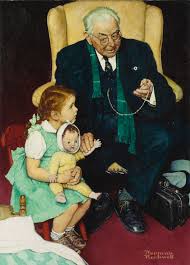
I grew up dialing a rotary phone, driving a stick shift, listening to the Brooklyn Dodgers on a transistor radio, receiving wedding congratulations via telegram, using a tape recorder, reading an analog clock, and watching my doctor listen to me and write down what I was saying. These aren’t secrets, but if you didn’t grow up with them, they might be holding some secrets from you in the same way that computer technology is holding secrets from me. At the very least, it is a challenge for the generations to communicate about it.
Case in point: let’s consider the medical world. On Wednesday I arrived on time for an 10:45 annual check up with my doctor and was immediately handed an Ipad and told (asked?) to update my medical history for their files. Twenty-five minutes later I handed in the Ipad and was immediately taken to the examination room.
Yes, twenty-five minutes. No, the doctor wasn’t behind schedule. That’s what it took me to scroll down to respond to hundreds (I didn’t count) of intensely personal questions that I’d never asked before by a doctor, questions, that in my humble opinion, were certainly not necessary to ask an old woman. Thankfully, somewhere along the way I noticed each section was marked as *Required or *Not Required. Eureka! I could speed up and mark something along the lines of ‘choose not to answer’--that is, until all those required, legal, non-disclosure forms at the end.
My comments to the nurse about the Ipad experience went on deaf ears. Instead of being an active listener and offering something along the lines of, “Yes, it is tedious,” she defended the process and need for all that information. My lovely doctor wasn’t tuned into my frustration or opinion either. She suggested that this summer she might have her teenaged daughter be in the office to help seniors “fill out” the form. “No,” I told her, “I can handle the technology, I just find the entire form is over the top.”
There are many secrets floating around among the old and young with this story. Maybe not secrets as much as generational misunderstandings and divides. We don’t get each other; that’s the way it is. I do, however, have some secrets about life and death that I’d like to share if anyone wants to listen. I don’t want the medical world to keep me alive for as long as is medically possible.
I’m not afraid of dying, nor am I afraid to face the death issue. As I watch all those TV ads from the pharmaceutical industry, and as I record my medical history on an Ipad, I have to wonder if the medical world can simultaneously embrace death and do all they can to save a life. Don’t get me wrong. I know that doctors participate in palliative care and hospice and that hospitals have medical ethics committees. I believe that those who work in the in health care are compassionate people. I am aware that the intricacies of medical insurance and the fear of lawsuits add to the complexity. But still, why as all those questions to an old lady? Maybe you have to be an old lady to even think about it.
Which brings me to a final secret on the topic. We old people know ageism when we see, or rather when we feel it. We don’t like it, and when we can work around it, we do. So, next time, I am going to refuse to fill in the Ipad form; instead I’ll pick up the book I’ve brought and start reading
 RSS Feed
RSS Feed